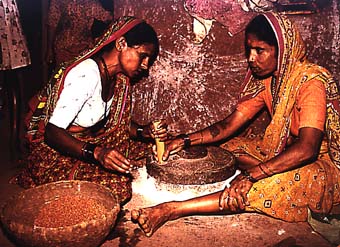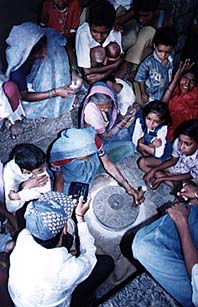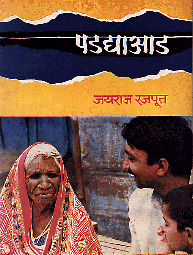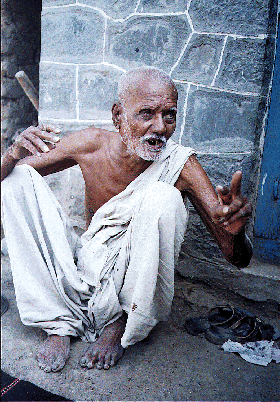Centre for Cooperative Research in Social
Sciences
(CCRSS, Pune, Maharashtra, India)
The CCRSS undertakes researches in symbolic systems and processes of social
communication among communities with a low social and cultural status in India.
Its cultural studies presently pertain to three fields of immense and immemorial
oral cultural patrimonies in India: women's folk songs,
social history of subordinated communities and
popular oral mythical narratives.
The objectives of the projects are similar: methodic collection of data,
classification and archiving (see a
cultural-sociological database), structural content analysis with
interpretation involving the informants (see Unfettered
Voices), write-ups and publications, seminars and eventually practical
valorization. The aims are identical: reveal ways and forms of cultural agency
characteristic of the subordinated.
All over the Indian sub-continent, peasant womenfolk for centuries did
compose and sing poetic verses while grinding on their stonemill the flour of
the day. We todate collected more than fifty thousand of such distichs (see
songs at the grindmill).
That exclusively feminine and oral tradition is to be preserved, first, on
account of its significant anthropological imports.

|
Moreover, the potentialities of that creative memory are to
be carried over: they indeed testify to an autonomous capacity of articulation
of one's insight into one's own past within the context of a patriarchal
dispensation (see
Sita's exile).
|
|

|
Listen to voice
That rich matrimony further offers a valid basis for a
reflexive and critical construction of a renewed identity in present times.
See:
I tell you woman
Stonemill and Bhakti
Femmes coolies en Inde
|
This is a case in point regarding a fruitful interface of tradition and
modernity, and the status of folk forms as vehicles of social cultural
communication (see Street drama and the
musicological-anthropological analysis of singing at the
grindmill).
|
Youth from traditionally repressed
communities or down-trodden groups who have the social vision, the will and the
elementary skills to that effect are assisted to observe, note down, record and
write extensively the past and present history of their community as narrated by
the elders, the women and the youth from their own community. The rationale
behind this attempt is that subordinated communities should be able through some
of their own representatives to articulate their own vision of the past and
build up a collective memory of their own. The initiative, the authority and the
skill to hold a discourse on lower social sections should not be left to
established intelligentsia from socio-culturally hegemonic classes. This task is
one naturally to be taken up by young social actors from within those repressed
communities themselves.
|

See: Ma caste
criminelle |
A number of oral myths circulate among tribal and marginalized communities
in India. They enshrine the world view of the latter. These cultural traditions
can not be disposed off as exotic, esoteric or primitive fables.
|

See: A myth from the Vadar community
Listen to voice |
They incorporate relevant, human and deep insights. They
authoritatively deal with fundamental issues such as gender, social status,
discrimination, power, salvation, identity, violence, etc. Still they speak a
language as strange as a code to be deciphered. A methodological key is
required to enable us to read and interpret those popular myths. Our research
starts with analytical and structural deconstruction of the narratives after the
manner of Claude Levi-Strauss, and then proceeds with hermeneutical
reappropriation understood as interpretative self-understanding after the manner
of Paul Ricoeur. |
This type of hermeneutics is construed as a strategy to establish an
efficient interaction between the cognitive symbolic forms embedded in ancient
oral myths and our modern anthropological categories or cognitive structures.
(Read more: Dalit Autobiographical
Narratives, Figures of Subaltern Consciousness, Assertion and Identity)
Return to home page of Centre
for Cooperative Research in Social Sciences (CCRSS, Pune)



